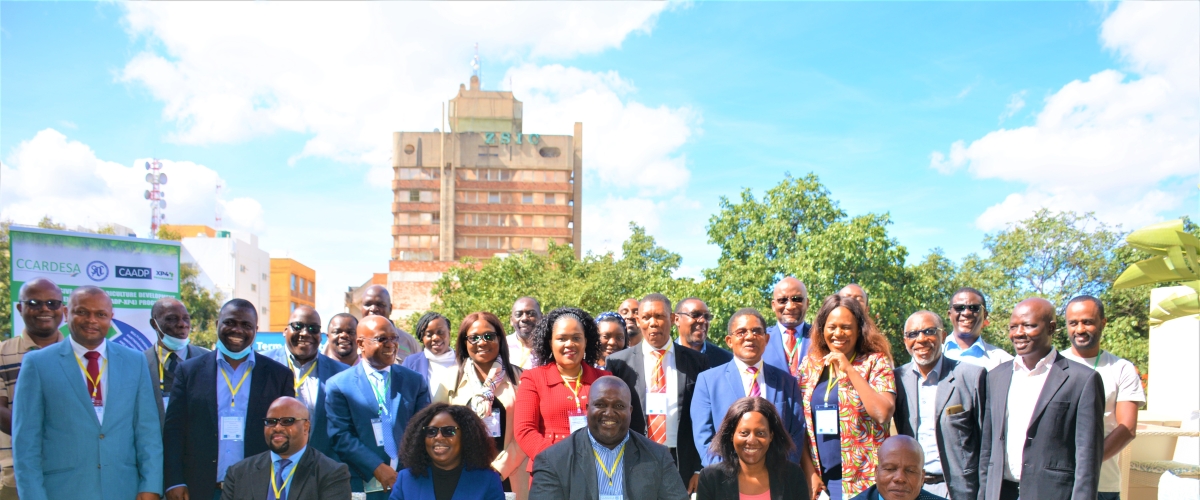
The agricultural sector in the SADC region is already experiencing the negative impacts of climate change which has serious implications for food security. This is particularly true among smallholder farmers, who comprise the majority of farmers in the region who are vulnerable because, most often, they do not have the means to adequately respond to the weather or climate extremes. CCARDESA has identified the promotion of climate-smart agriculture approaches as a critical strategy that stakeholders in the SADC region can use to adapt and/or mitigate the impact of climate change.
To further advance this effort toward building resilient food systems in Southern Africa, CCARDESA is convening a regionla workshop at Hilton Hotel in Lusaka, Zambia, from 6th to 11th June, 2022. The workshop's primary purpose is to consult the region and allow stakeholders to provide input to the work of CCARDESA relating to climate-smart agriculture cross border trade,agroecology and the involvement of the private sector in promoting CSA. The meeting will also distil CSA issues for further regional dialogues leading to the forthcoming 27th Conference of Parties (COP) of the UN Framework Convention on Climate Change.
In his opening remarks, the CCARDESA Executive Director, Dr Cliff Dlamini, stated CCARDESA's position on creating strategic partnerships to enhance the mutual development of joint interventions to support climate-smart agriculture initiatives in the region. He stressed the need to include women and youth in all the interventions as they form 70% of the agricultural sector workforce in Africa. Dr Dlamini also touched on a subject close to his heart, that of knowledge translation. He implored the participants to translate knowledge into user-friendly formats, giving the key target audiences comprehensive coverage. To better knowledge translation and avoid duplication of efforts, he advised forging strategic partnerships with institutions that have been doing this over time.
Dr Dlamini mentioned that CCARDESA, especially under the CAADP-XP4 program, has undertaken many studies that produced outputs requiring dissemination. He said he was also aware of the stakeholders in the room with similar studies awaiting dissemination. He urged participants to regularly disseminate and share studies for lesson learning, knowledge exchange and transfer of good practices. "If you don't disseminate your studies, it's like having good wine locked in a locker but not allowing anyone to drink it." He reiterated.
In conclusion, Dr Dlamini declared that CCARDESA was open to collaboration, consultation, joint partnership, and joint resource mobilization with various stakeholders.
At the same meeting, the CCARDESA Grants and Programmes Manager, Dr Simon Mwale, shared with the participants more about the World Bank Funded, Accelerating Impacts of CGIAR Climate Research for Africa (AICCRA) project that CCARDESA is implementing in Zambia. He indicated that the program started with Zambia and will spill over to other countries. It also aligns with CCARDESA's guiding principle to implement multi-country initiatives to fulfil its coordination role.
Dr Mwale mentioned that CCARDESA leads the process of conducting studies to synthesize the available CSA technologies and disseminate the report to stakeholders. The outputs of the studies are part of the inputs toward capacity development and learning, and such knowledge will spill over to other countries. CCARDESA also participates and contributes to other activities of the project, including training the partners and key stakeholders in the region on the use of CSA, focusing on knowledge products, approaches, and available dissemination tools.
The CAADP-XP4 Coordinator, Dr Baitsi Podisi, also shared the status and achievements of the CAADP-XP4 program and its mode of operation based on co-partnerships with other SROs from the other sub-regions. He also mentioned how the program is working towards addressing the gaps that came up in its Mid-Term review, including mainstreaming gender in all of its interventions, strengthening the resource mobilization efforts of the project, and promoting policy reform and uptake at national levels.
The meeting expects to reflect on the efforts of developing a regional advocacy strategy for promoting cross border trade in agriculture commodities and farm inputs. It will further identify key regional activities as follow-on activities from the studies concluded on cross border trade and identify actions for gender mainstreaming and the involvement of the private sector in promoting CSA.
Besides identifying the best-bet CSA approaches and the tools for CSA information and technology dissemination, the participants will deliberate on the emerging topic of agroecology.
Last but not least, this engagement will familiarize the participants and the National project stakeholders with the CAADP-XP4 and AICCRA activities.
The meeting is attended by participants from academic institutions, research organizations, farmers, farmer organizations, community organizations, CSA activists and youth organizations from Botswana, Eswatini, Malawi, Mozambique, Kenya, Tanzania, Zambia and Zimbabwe. The European Union funds the CAADP-XP4 project financed through IFAD, and the World Bank funds the AICCRA programme.





